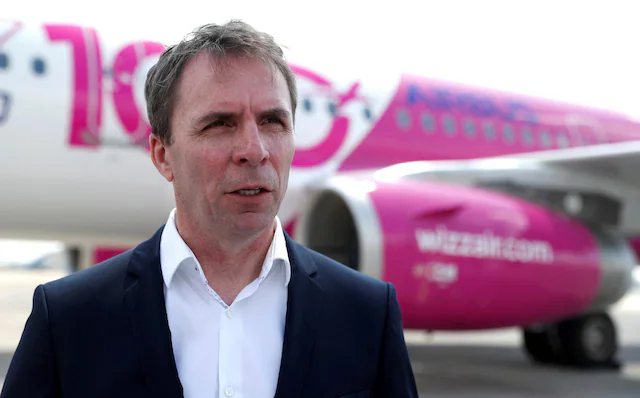Wizz Air exit Gulf operations is making headlines after the airline’s CEO blamed Abu Dhabi for breaking a key agreement. In a surprising announcement, Wizz Air revealed it is pulling out of the Gulf market entirely, ending its presence just three years after launching in the region. This sudden exit has raised questions about what went wrong between the airline and Abu Dhabi’s aviation authorities.
The focus keyword “Wizz Air exit Gulf” is at the centre of this news story, reflecting a significant shift in aviation strategies for both the airline and the region. The decision affects thousands of passengers, aviation employees, and investors who saw the partnership as a long-term commitment.
Let’s dive into the background, the reasons, and the consequences behind this unexpected Wizz Air exit Gulf event.
Wizz Air’s Arrival in Abu Dhabi
In 2020, Hungarian low-cost carrier Wizz Air launched its subsidiary, Wizz Air Abu Dhabi, in a strategic partnership with Abu Dhabi Developmental Holding Company. The goal was to create a new airline that would serve Gulf, South Asian, and African routes with extremely low fares.
Backed by strong government support and boasting a fleet of modern Airbus A321neo aircraft, the airline’s growth plans were aggressive. It introduced multiple regional destinations, offering ticket prices as low as AED 99. It seemed like a win-win for Abu Dhabi’s aviation growth strategy and for Wizz Air’s global expansion.

Sudden U-turn: Wizz Air Exit Gulf
However, only three years later, Wizz Air shocked the aviation world by announcing a complete exit from the Gulf. The Wizz Air exit Gulf scenario has left industry observers baffled, especially considering the rapid growth and competitive pricing that had helped the airline gain regional attention.
According to CEO József Váradi, the root cause was a breakdown in trust. He claimed that the Abu Dhabi side went back on promises and failed to honour key parts of the deal. This breach of understanding, he stated, made it impossible for Wizz Air to continue operations sustainably in the Gulf.
Reason 1: Alleged Breach of Contract
At the core of the Wizz Air exit Gulf story is an alleged breach of contract. CEO Váradi pointed to what he described as an unexpected reversal from the Abu Dhabi partner on agreed terms.
Though he did not share the full details publicly, reports suggest that landing rights, financial support, and operational permissions were part of the original agreement. Once those terms changed, the airline found itself operating under conditions it did not agree to when entering the partnership.
Reason 2: Regulatory and Political Challenges
The Gulf region is known for its heavy government involvement in aviation. While this often results in world-class infrastructure and fast expansion, it also means sudden policy shifts can impact private players.
For Wizz Air, this translated into regulatory delays, route approval challenges, and a lack of transparency in decision-making. These challenges weakened its position in the market and eventually forced the airline to reconsider its investment.
Reason 3: Market Saturation and Price Wars
Despite its bold entry, Wizz Air found itself in a highly competitive market. Established Gulf carriers like Air Arabia, flydubai, and Etihad already offered competitive fares. Wizz Air’s ultra-low-cost model, which thrives in Europe, struggled to attract consistent passengers amid intense price wars.
This saturation reduced profit margins. Combined with the breakdown in the Abu Dhabi deal, the airline had fewer tools to fight back, making the Wizz Air exit Gulf inevitable.
Reason 4: Strategic Shift in Company Vision
Wizz Air has been reevaluating its global strategy in light of post-pandemic shifts and increasing operational costs. The airline has shown signs of consolidating its operations, focusing on core markets in Europe where profitability is higher.
The Gulf exit might be part of this realignment. With no guarantee of long-term political support in Abu Dhabi, and in light of newer challenges in the region, the leadership likely saw more value in withdrawing early than continuing in a difficult environment.
Reason 5: Loss of Trust in Local Partners
Perhaps the most significant reason behind the Wizz Air exit Gulf event is the reported loss of trust. In a competitive and political region like the Gulf, strong and reliable partnerships are crucial.
CEO Váradi’s remarks suggested that Wizz Air no longer felt secure in its alliance with Abu Dhabi stakeholders. When trust is lost in aviation—where safety, compliance, and long-term capital are involved companies often choose to walk away instead of risking brand damage or legal trouble.
Consequences of the Wizz Air Exit Gulf
The sudden exit has had wide-ranging effects. Hundreds of employees in the UAE and neighboring countries face job uncertainty. Passengers who relied on cheap travel options to cities like Alexandria, Baku, and Muscat must now look elsewhere.
Abu Dhabi’s ambitions to be a budget aviation hub also took a hit. While other airlines like Air Arabia Abu Dhabi continue operations, the departure of a global brand like Wizz Air signals that foreign partnerships are not always stable in the Gulf.

Official Statements
Wizz Air issued a formal statement confirming its exit but did not offer specific timelines for winding down operations. It assured ticket holders that existing bookings would be honoured or refunded, and that safety remained a priority.
Abu Dhabi authorities have remained largely silent on the matter, fuelling speculation that internal negotiations may have broken down or that other political considerations played a role in the sudden Wizz Air exit Gulf.
What Comes Next?
For Wizz Air, the focus is likely to shift back to Europe, where the airline continues to grow. It recently announced new routes in Italy, Poland, and the UK, and is expanding its fleet.
In the Gulf, the exit leaves a gap that other carriers will try to fill. Travellers may feel the loss of ultra-low fares in the short term, but the market is expected to recover as local airlines increase frequency on popular routes.
Expert Opinions
Aviation analysts believe the Wizz Air exit Gulf serves as a warning to other foreign carriers. It highlights the need for watertight agreements and long-term commitment from both parties. In highly controlled aviation markets, foreign airlines must navigate complex local dynamics.
Industry insiders suggest that unless Abu Dhabi addresses the concerns raised by Wizz Air, it may find it difficult to attract similar partnerships in the future.
Final Thoughts
The Wizz Air exit Gulf case is a powerful reminder of how fragile international aviation partnerships can be. Even with solid planning, things can go wrong if trust breaks down or if political dynamics shift.
As global aviation continues to evolve post-COVID, both governments and airlines must prioritise transparency, consistency, and long-term vision. Otherwise, as Wizz Air has shown, even the most promising ventures can unravel within just a few years.
Do follow Gulf Magazine on Instagram
Also Read – Gulf Visa Rejected? Avoid These 5 Costly Mistakes in 2025



